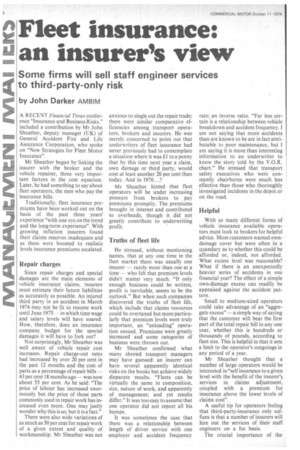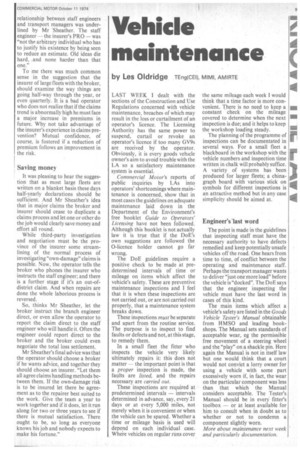Fleet insurance: an insurer's view
Page 94

Page 95

If you've noticed an error in this article please click here to report it so we can fix it.
Some firms will sell staff engineer services to third-party-only risk
by John Darker AMBIM
A RECENT Financial Times conference "Insurance and Business Risks," included a contribution by Mr John Sheather, deputy manager (UK) of General Accident Fire and Life Assurance Corporation, who spoke on "New Strategies for Fleet Motor Insurance".
Mr Sheather began by linking the insurer with the broker and the vehicle repairer, three very important factors in the cost equation. Later, he had something to say about fleet operators, the men who pay the insurance bills.
Traditionally; fleet insurance premiums have been worked out on the basis of the past three years' experience "with one eye on the trend and the long-term experience". With growing inflation insurers found their claims reserves inadequate and as these were boosted to realistic levels insurance premiums escalated.
Repair charges
Since repair charges and special damages are the main elements of vehicle insurance claims, insurers must estimate their future liabilities as accurately as possible. An injured third party in an accident in March 1974 may not be fit to resume work until June 1975 — in which time wage and salary levels will have soared. How, therefore, does an insurance company budget for the special damages it will have to fork out?
Not surprisingly, Mr Sheather was well aware of vehicle repair cost increases. Repair charge-out rates had increased by over 20 per cent in the past 12 months and the cost of parts as a percentage of repair bills 43 per cent 18 months ago — was now about 55 per cent. As he said: "The price of labour has increased enormously but the price of those parts commonly used in repair work has increased even more. One may justly wonder why this is so; but it is a fact."
There were also wide variations of as much as 50 per cent for repair work of a given extent and quality of workmanship. Mr Sheather was not anxious to single out the repair trade; there were similar comparative efficiencies among transport operators, brokers and insurers. He was merely concerned to point out that underwriters of fleet insurance had never previously had to contemplate a situation where it was £1 to a penny that by this time next year a claim, own damage or third party, would cost at least another 20 per cent than today. And in 1976...?
Mr Sheather hinted that fleet operators will be under increasing pressure from brokers to pay premiums promptly. The premiums brought in interest and contributed to overheads, though it did not greatly contribute to underwriting profit.
Truths of fleet life
He stressed, without mentioning names, that at any one time in the fleet market there was usually one insurer — rarely more than one at a time — who felt that premium levels didn't matter very much. "If only enough business could be written, profit is inevitable, seems to be the outlook." But when such companies discovered the truths of fleet life, which include that claims resources could be overtaxed but more particularly that premium levels were truly important, an "unloading" operation ensued. Premiums were greatly increased and some categories of business were thrown out.
Mr Sheather confirmed what many shrewd transport managers may have guessed: an insurer can have several apparently identical risks on the books but achieve widely disparate results. "Fleets can be virtually the same in composition, size, nature of work, and apparently of management; and yet results differ." It was too easy to assume that one operator did not report all his bumps.
It was sometimes the case that there was a relationship between length of driver service with one employer and accident frequency rate; an inverse ratio. "Far less certain is a relationship between vehicle breakdown and accident frequency. I am not saying that more accidents than are known to be are in fact attributable to poor maintenance, but I am saying it is more than interesting information to an underwriter to know the story told by the V.O.R. chart." He stres'sed that transport safety executives who were constantly chairborne were much less effective than those who thoroughly investigated incidents in the depot or on the road.
Helpful
With so many different forms of vehicle insurance available operators must look to brokers for helpful advice. Most customers wanted owndamage cover but were often in a quandary as to whether this could be afforded or, indeed, not afforded. What excess level was reasonable? What if there is an unexpectedly heavier series of accidents in one financial year? The effect of a simple own-damage excess can readily be appraised against the accident pattern.
Small to medium-sized operators could take advantage of an "aggregate excess" — a simple way of saying that the customer will bear the first part of the total repair bill in any one year, whether this is hundreds or thousands of pounds, according to fleet size. This is helpful in that it sets a limit to the operator's outgoings in any period of a year.
Mr Sheather thought that a number of large operators would be interested in "self insurance to a given level with the benefit of the insurer's services in claims adjustment, coupled with a premium for insurance above the lower levels of claims cost".
A useful tip for operators feeling that third-party-insurance only suffices is that a number of insurers will hire out the services of their staff engineers on a fee basis. • The crucial importance of the relationship between staff engineers and transport managers was underlined by Mr 'Sheather. The staff engineer — the insurer's PRO — was "not the arbitrary individual who has to justify his existence by being seen to reduce an estimate. Old ideas die hard, and none harder than that one."
To me there was much common sense in the suggestion that the insurer of large fleets with the broker, should examine the way things are going half-way through the year, or even quarterly. It is a bad operator who does not realize that if the claims trend is abnormally high he must face a major increase in premiums in future. Why not take advantage of the insurer's experience in claims prevention? Mutual confidence, of course, is fostered if a reduction of premium follows an improvement in the risk.
Saving money
It was pleasing to hear the suggestion that as most large fleets are written on a blanket basis these days half-yearly declarations should be sufficient. And Mr Sheather's idea that in major claims the broker and insurer should cease to duplicate a claims process and let one or other do the job would clearly save money and effort all round.
While third-party investigation and negotiation must be the province of the insurer some streamlining of the normal process of investigating "own-damage" claims is possible. Now, the operator tells the broker who phones the insurer who instructs the staff engineer; and there is a further stage if it's an out-ofdistrict claim. And when repairs are done the whole laborious process is reversed.
So, thinks Mr Sheather, let the broker instruct the branch engineer direct, or even allow the operator to report the claim direct to the staff engineer who will handle it. Often the engineer could report direct to the broker and the broker could even negotiate the total loss settlement.
Mr Sheather's final advice was that the operator should choose a broker if he wants advice, and together they should choose an insurer. "Let them all agree claims handling methods between them. If the own-damage risk is to be insured let there be agreement as to the repairer best suited to the work. Give the team a year to work together and if it does, let it run along for two or three years to see if there is mutual satisfaction. There ought to be, so long as everyone knows his job and nobody expects to make his fortune."




























































































































































